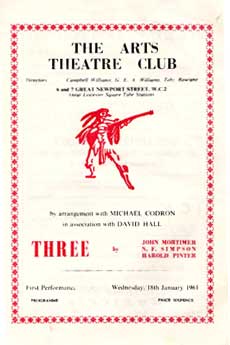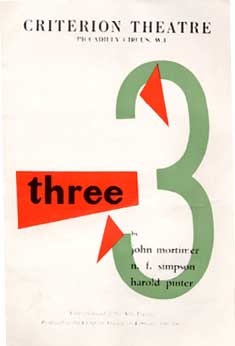
Programme Cover
|
First presented on stage by Michael
Codron at the Arts Theatre, London on 18th January 1961,
and subsequently at the Criterion Theatre with two plays by John
Mortimer and N.F. Simpson
Edward - Emlyn Williams
Flora - Alison Leggatt
The Matchseller - Richard Briers
Directed by Donald McWhinnie
Settings and Lighting - Brian Currah
The sound of the words
H.A.L. Craig
‘A Great Bill’ is how they describe Joe Erskine v. Henry Cooper
at boxing; and ‘a great bill’ is what we have for our winter nights
at the Arts. If anyone is unable to swallow Mortimer, Simpson and
Pinter in a full draught, he may have them in capsule here, done
as a selling package with the alchemical title, Three. The
three are also interesting as mongrels, for tow of them, the Mortimer
and the Pinter, were conceived as radio plays.
Donald McWhinnie has produced Harold Pinter’s A Slight Ache
with the three actors doing what comes unnaturally: effacing themselves.
They are sound waves made man. Emlyn Williams speaks his opening
lines with a newspaper up in front of his face and that obduction
sets the pace for the most standstill performing we have seen outside
the Palace Guards. Except for a brief flurry of sexual body blows
– Queensberry Rules – his wife (Alison Leggatt) is equally still;
while the third of this rigid trio, a match-seller (Richard Briers),
neither speaks, nor twists, nor lights a match, nor shows his face,
nor offers a single projection for the length of the play. I sat
a few yards from these actors for an hour, yet I would not have
recognised one of them in the street ten minutes later. Mr. McWhinnie
almost rubbed them out. Yet Emlyn Williams can do his anonymous
road home certain of an individual performance.
In many ways Mr. McWhinnie’s production of A Slight Ache
is more interesting than his famous production of The Caretaker.
It is more original. It puts before an audience in the theatre a
radio play that was written in terms of no audience and sent out
– Mr. Pinter knew not where – after dark by a corporation. A
Slight Ache has , in itself, no business with a theatre; but
it is working wonderfully at the Arts. It is indeed a bird in the
hand.
Lunch Hour by John Mortimer (the first of Three at
the Arts) is desquamated, gutted and got over with very quickly.
Its idea – a frustrated sex encounter at lunch time between a typist
and the number two in the textile buying department – is a clever
one; its playing, Emlyn William’s despair and Wendy Craig’s innocence,
is nearly perfect. In the train-load of young men now coming into
the theatre, the superb Miss Craig is one of the very few young
actresses fit to travel first-class in their company. But even she
could not make Lunch Hour less painful in its clumsy shifts
of identity: there is a vulgar weevil somewhere at its core (the
cheap laughs at ‘Indian Gentlemen’, for instance). The girl’s taking
on of her cover story – as the man’s invented long-distance wife
– probably worked smoothly on the Third last summer; radio is an
easy changing-room and even an indifferent actress can inflect herself
several ways. But on the stage Lunch Hour defied the best
Miss Craig could do. It remained a clever idea for a play. The words
do not touch physical tensions so solidly put before us.

Programme Cover |
Mr. Pinter, on the other hand, is a writer of curious
imagination, who always uses words precisely. What he puts down
is right wherever it is heard. The fascination of A Slight Ache,
and indeed of most of Mr. Pinter’s other work, is its relation
with its audience. This play ends with a collapse on stage and a
worried audience watching it. But each member of the audience is
worried in his own way; Mr. Pinter is not just writing for a conventional
theatre response.
A play – we are constantly reminding ourselves – is a conspiracy
between the stage and the auditorium; the force of gravity that
determines a play’s weight resides in the rows of round white blotters
the actor sees across the footlights: to write a play without an
audience is like cooking a meal without having someone to eat it.
But the radio is so out of touch that the dramatist cannot even
imagine his audience. Are they, like Antony, standing or sitting,
or, like Dr. Crippen, displacing the floor boards? Radio’s promise
of a million listeners is the merest statistic; the real figure
is found, mathematically, by crossing off the noughts. You are left
with one. What seems the most public of forms is without doubt the
most private. The responses are single, the realisation is lonely.
Radio’s theatre is the listener’s mind.
Mr. Pinter’s plays are uncommon in the theatre because their meaning
is referable to the audience. In themselves, the plays conclude
nothing, though they start much; they seem to be alive with hares.
Our experience is perhaps comparable to a child’s experience in
reading about Blind Pew in Treasure Island. Blind Pew comes
in the dark, tapping, menacing the child alone with the book. In
the same way, Mr. Pinter is getting at the mind in its isolation.
The mysterious hares and the flashing bog-lights that might set
all afire, are the perfect images of the wireless set. In making
them valid in the theatre Mr. Pinter has extended the theatrical
experience. He is not writing to an audience, but to an audience,
but to each member of it.
The Form by N. F. Simpson is very funny for ten minutes but
does not last the half-hour. The calm absurdity, the non sequiter,
the logic that has no middle, Mr. Simpson’s marvellous sailing in
a sieve, needs more definition than he gives it here – a
slight matter of inconclusion among office workers. When a work
of art can go on forever, it travels only a short distance. But
there is non doubting Mr. Simpson’s art or the originality of his
joking. The Form gave Richard Briers a chance to show himself,
a superb player and timer of non-sense.
Though the ‘Great Bill’ is uneven in quality – Mr. Pinter so tops
it – Three is an excellent idea of theatre, and a bouquet
for the Arts. I hope it lives long in London.
The New Statesman, January 1961
© New Statesman 2001
|



